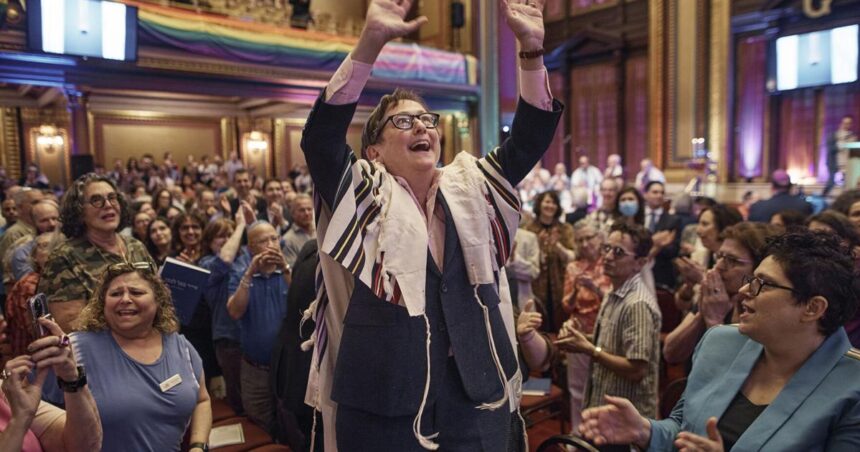NEW YORK — Rabbi Sharon Kleinbaum has led the nation’s largest LGBTQ+ synagogue through the challenges and triumphs of the modern gay-rights movement for over three decades. From the AIDS crisis to the historic civil-rights gains like marriage equality and the recent backlash against transgender rights, she has been at the forefront.
Now, after 32 years, she is stepping down and moving into retirement. Congregation Beit Simchat Torah, the New York City synagogue she led, will need to redefine itself after being closely associated with its prominent rabbi for so long.
Her retirement comes during a time of uncertainty for the LGBTQ+ rights movement. While same-sex marriage is now legal nationwide, conservative forces are enacting restrictions on transgender healthcare, limiting LGBTQ+ education in schools, and proposing bans on drag performances.
People are also reading…
“I’ve been fortunate to serve God’s vision for the world with the gifts I have,” Kleinbaum said in an interview. “I feel that now is the time to make space for a new generation.”
Embraced by her congregation and progressive politicians, Kleinbaum, 65, espoused a bold progressive vision for Judaism that extended beyond Manhattan and liberal Judaism.
During Donald Trump’s presidency, Kleinbaum initiated outreach to Muslims at the synagogue. The congregation also established an immigration clinic to aid LGBTQ+ refugees in obtaining asylum in the U.S.
“Helping immigrants is a religious duty. It is just as crucial for us as leading our services on Friday nights,” Kleinbaum emphasized.
Congregation Beit Simach Torah, known as CBST, has around 1,000 paying members, with about 4,000 attendees, spanning from nonreligious to Orthodox, at its High Holy Day services.
The temple’s congregants have included prominent figures from the media and LGBTQ+ community. Edie Windsor, Andy Cohen, and Joan Rivers are among those who have been part of CBST. Kleinbaum’s wife is Randi Weingarten, the head of the nation’s largest teachers union.
Upon her appointment in 1992, Kleinbaum faced the task of burying many members of her congregation, many succumbing to AIDS. This need for pastoral care was a driving force in hiring the synagogue’s first rabbi.
Throughout the 1990s, Kleinbaum navigated the increased visibility of the LGBTQ+ community in the public eye, alongside setbacks like the Defense of Marriage Act which restricted marriage to heterosexual couples.
“She was doing critical work with a community that tragically lost a significant portion of its members to AIDS,” said William Hibsher, a long-time CBST member.
Hibsher, initially a non-observant Jew, was inspired by Kleinbaum’s work and the care she provided to his partner who passed away from AIDS. He became deeply involved with CBST, eventually serving on the board of directors and contributing to the fundraising for its current location.
After the legalization of same-sex marriage in New York in 2013, Kleinbaum conducted outdoor weddings for same-sex couples across from the marriage bureau. She also served on the U.S. Commission on International Religious Freedom appointed by President Joe Biden.
“She can find common ground with those who have opposing views on key issues,” said Fred Davie, a friend of Kleinbaum’s.
Jason Klein has been named as the new chief rabbi of CBST, starting on July 1. However, many members believe that Kleinbaum’s presence will be irreplaceable.
“I think deep down, many wanted a Kleinbaum 2.0 to take her place,” Hibsher noted. “The congregation will need to decide if there is still a need for an LGBTQ+ synagogue in 2024. I believe there is.”
While Kleinbaum announced her departure from CBST a year ago, her impending retirement was met with surprise by many at Yom Kippur services last September. Her second-to-last Shabbat service, held in June, was a sold-out event with New York Attorney General Letitia James as the keynote speaker.
“Most importantly, she has created a safe and free space for us,” James said, pointing to the synagogue and the crowd. “This space is invaluable.”





